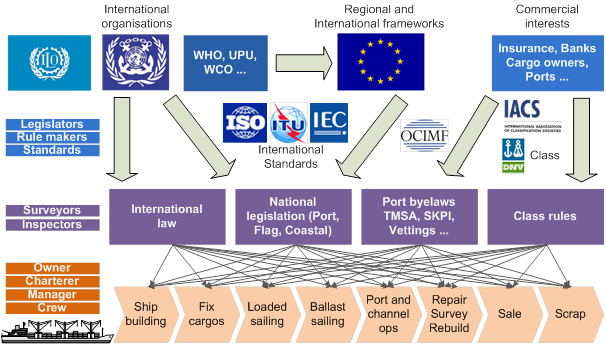New EU Project Aims to Improve Efficiency of Maritime Regulations
A new three year European Research Project, partly funded by the EU has been launched to help increase efficiencies in regulation compliance and enforcement for the maritime sector. e-Compliance will facilitate tighter integration and co-operation in the fragmented field of regulatory compliance. It will closely align with the EU e-Maritime initiative of which a key priority is supporting authorities and shipping operators to collaborate electronically in regulatory information management.
The maritime sector is, by necessity, heavily regulated. International, EU and national authorities create large numbers of rules and regulations; the long lifetime of ships and the different phases of their operation add to the complexity. As a result, practitioners who need to enforce or comply with regulations are often unsure as to which rules apply for a given vessel in a given situation.

Building on the success of other EU projects such as FLAGSHIP, e-Compliance will look at creating a model for managing maritime regulations digitally and thus help to harmonise these regulations. The project’s consortium comprises representatives of the three main stakeholder groups involved: classification societies (who create class rules), port state control (who enforce regulations) and ships (who need to comply with regulations). This seamless co-operation between the different stakeholder groups will improve the effectiveness of regulations and reduce the burden on practitioners who work with maritime regulations on a daily basis.
Philipp Lohrmann, Project Manager for e-Compliance comments: “Presently, there are numerous disparate initiatives and projects that address specific aspects of the regulatory domain. The e-Compliance project will bring these different approaches together, using their most promising aspects in order to increase coherence and efficiency in the world of maritime regulations.”
Specific activities within this three year R&D project will include:
Establishment of a cooperation model between regulation setting and enforcement authorities, both for port state control and IMO regulations, for modelling and interpreting regulations and ensuring harmonisation across national and organisational boundaries.
Demonstration of automated compliance management by:
Modelling and delivery of regulations in electronic format
Harmonised e-Services for more effective and co-ordinated enforcement controls and inspections
e-Services in support of class requirements, particularly on surveys and for ship risk management in upgraded e-Maritime applications
Evaluation of the practical implementation of the above in representative networks and the provision of recommendations for e-Maritime policies.
e-Compliance consists of 10 partners, all of which bring their own areas of knowledge and experience of working in the maritime space. They include: BMT Group Ltd, Det Norske Veritas (DNV), Danaos Shipping Co Ltd, INLECOM Systems, The Netherlands Organisation for Applied Scientific Research (TNO), TEMIS, Acciona Infraestructuras, PORTIC Barcelona, Norsk Marinteknisk Forskningsinstitutt AS (MARINTEK) and the Maritime Administration of Latvia.
